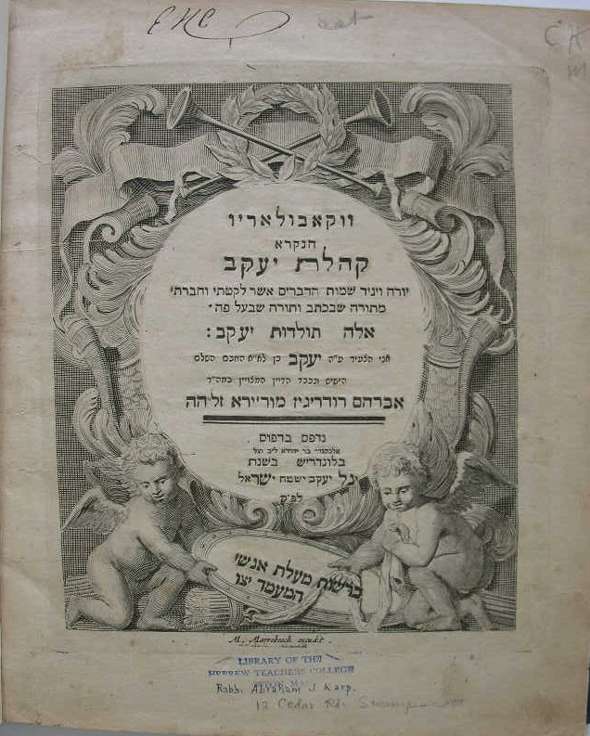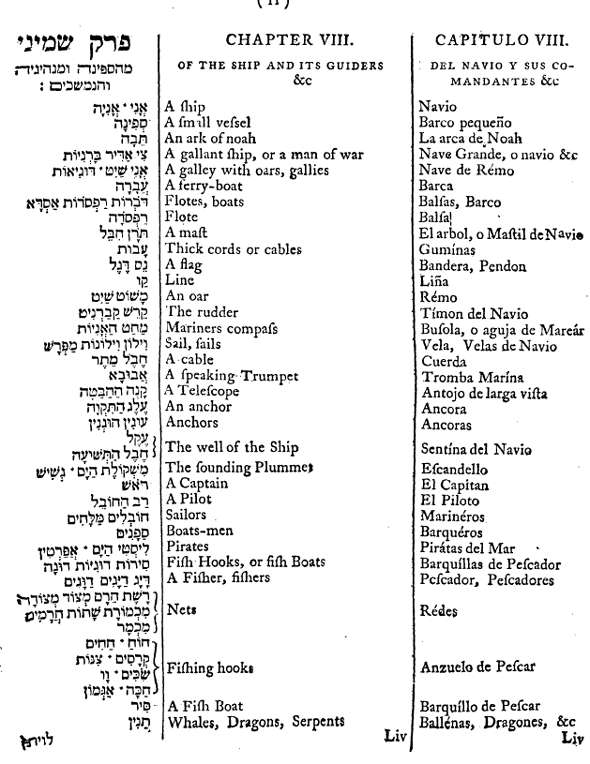The fascinating book ווקאבולאריו הנקרא קהלת יעקב, also titled "Kehilath Jahacob, being a Vocabulary of Words in the Hebrew Language" deserves a series of posts, if not a book-length[1] treatment. Published in London in 1773, this dictionary was compiled by Jacob Rodrigues Moreira. Jacob arranged and carefully pointed Hebrew terms and phrases according to subject, coining new terms where needed. He also translated them into Spanish, while his son Haim translated them into English. The result was this trilingual Vocabulario. In the Preface, he explains that his aim is to aid his children and disciples who have a desire to become "masters of the holy language" and to "increase the knowledge of God's Holy Word" which at present is lacking with many who [only] read Hebrew. He also notes that the reason his work is arranged into 58 sections is because 58 is the numerical value of the Garden (הגן) and to call to mind the first command given to Adam (Gen. 2.16). That is, he wants the reader to eat the fruits of the trees! - enjoy his book.

Like I said, the book (published in 1773) is unspeakably interesting if you're the sort who likes to curl up with a lexicon. Below is the seafaring terms on pg. 11:

As you can see, in 1773 sea terms needed to include terms for oar, rudder, compass, telescope, anchor and pirates. For the latter term, Rodrigues Moreira used ליסטי הים or אפרטין. Both good choices. אפרטין is a rare rabbinic Hebrew term meaning "sea robber," and presumably derived from the same Greek source as the word pirate itself (see Yalkut Shim'oni to Lev. 19:23). Incidentally many people surmise that the rabbinic Hebrew term for bandit ליסטים is the plural, meaing bandits (see the first Rashi on the Torah). But if so, what is its singular? Uhhh. As Rabbi Elijah Levita correctly notes in his Tishbi, the Greek term from which the Hebrew is derived is ליסטיס and that is also the proper singular form in Hebrew. When pluralized the final ס was dropped and a נ is added, making ליסטין, a proper rabbinic Hebrew plural. That many (most?) texts today read ליסטים is a mistake. ס looks like ם. Thus Moreira took ליסטים as the plural, which he would not have done if he'd realized that ליסטיס is the singular. His neologism then would have read ליסטיסי הים, if not ליסטין הים. Or not. In any event, his term is ליסטי הים.
But I digress.
When it comes down to it, so much of the book is devoted to modern terms that one is left to wonder how it is that he expected the book to really increase the ability of students to comprehend Hebrew writings more so than to write new ones themselves. The book includes terms for lemonade, umbrella, a gift to a harlot, "the f[emale] secret part," itchy nose, sore throat, lawyer (תורני), Indian cane, pea soup, clean meat (בשר כשר), fourteen separate terms for "wine," wax candle, tallow candle, blunderbuss, tobacco leaves - in short, I could go on and on but it's in reality a word list for life in the 18th century.
After the categories are exhausted (and I mean exhausted) the final chapters include various appendices. For example, the 50th sections lists all the Shofetim (Judges) over Israel and the years of their reign. It also lists various converts to Judaism, beginning with Jethro and ending with Herod and Agrippa.
Chapter 55 deals with numbers and the calendar. Chapter 57 ("Of Titles of Honor") tells us how to address various classes of people: a king, a prince, a duke, a pope, a gentleman, and so forth (all in Hebrew, English and Spanish). Perhaps he had a sense of humor, for the chapter continues to instruct what sounds animals make (e.g., the Hog grunts = חזיר מלגלג). The final, 58th chapter is an imaginary dialog between the author and his son.
[1] I refuse to use the word "monograph." Or "desideratum," or "efflorescence." The book was discussed from the Spanish language point of view in a three part article called "Castellano, judeoespañol y. portugués: el vocabulario de Jacob Rodrígues Moreira y los sefardíes londinenses" by Kenneth Adams in Sefarad 26-27 (1966-67), but obviously that's not the angle I'd still like to see studied.
